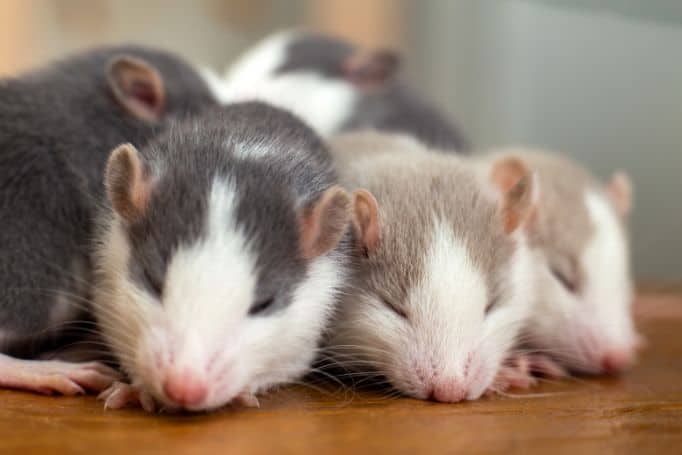Rats are small, intelligent creatures that have been domesticated for centuries. While many people view them as pests, rats can make great pets and have become increasingly popular in recent years.
One question that rat owners and enthusiasts often ask is how and where do rats sleep? In this blog post, we will explore the anatomy, physiology, sleeping habits, and factors that influence rats’ sleeping habits, as well as the risks of sleep deprivation in rats.

Basic Anatomy and Physiology of Rats
Rats belong to the rodent family, which includes mice, squirrels, and beavers. They have a long, pointed snout, small ears, and a long tail. Rats are nocturnal animals, which means they are most active at night.
Sleep Patterns in Rats
Rats are polyphasic sleepers, which means they sleep in short bursts throughout the day and night. They do not have a set sleep schedule and can sleep anywhere from 12 to 14 hours per day, depending on their age and activity level.
Rats are also known to take naps throughout the day, which may last anywhere from a few minutes to a few hours.
Sleeping Habits of Rats
Rats’ Preferred Sleeping Places
Rats are social animals and prefer to sleep in groups. In the wild, rats will create nests in burrows, trees, and other hidden areas. In captivity, rats will often sleep in hammocks, nesting boxes, or other small, enclosed spaces.
It is important to provide rats with a comfortable and secure place to sleep, as they can become stressed and anxious if they do not have a designated sleeping area.
Rats’ Sleeping Habits During the Day and Night
As previously mentioned, rats are polyphasic sleepers and can sleep at any time of the day or night. However, they are most active at night and will often be awake and active during the early morning and late evening.
During the day, rats may take short naps or rest quietly in their sleeping area.
Factors Influencing Rats’ Sleeping Habits
Food and Water Availability
Food and water availability can have a significant impact on rats’ sleeping habits. If rats are hungry or thirsty, they may stay awake and active in search of food or water.
Providing rats with a balanced diet and access to fresh water can help promote healthy sleeping habits.
Temperature and Lighting Conditions
Rats are sensitive to changes in temperature and lighting conditions. They prefer to sleep in warm, dark areas that are free from drafts and bright light.
If the temperature in their sleeping area is too cold or too hot, rats may have difficulty sleeping and may become stressed or ill.
Activity Levels and Social Factors
Rats are social animals and prefer to sleep in groups. They may become stressed or anxious if they are separated from their cage mates or do not have a designated sleeping area.
Rats that are kept in busy or noisy environments may have difficulty sleeping and may become agitated or aggressive.
Health and Sleeping Issues in Rats
Common Sleeping Problems in Rats
Like humans, rats can experience sleep problems. Common sleep issues in rats include insomnia, sleep apnea, and snoring.
These sleep problems can be caused by a variety of factors, including poor diet, environmental conditions, and health issues.
If you notice that your rat is having trouble sleeping, it is important to consult with a veterinarian to identify the underlying cause of the problem.
Risks of Sleep Deprivation in Rats
Sleep deprivation can have serious consequences for rats. It can lead to decreased immune function, increased stress levels, and a higher risk of illness and disease.
Rats that are kept in noisy or stressful environments may be at a higher risk of sleep deprivation and may require additional support and care to ensure they get the rest they need.
Conclusion
In conclusion, rats are polyphasic sleepers that prefer to sleep in warm, dark areas that are free from drafts and bright light. They are social animals that prefer to sleep in groups and may become stressed or anxious if they do not have a designated sleeping area.
Factors that can influence rats’ sleeping habits include food and water availability, temperature and lighting conditions, and activity levels and social factors.
It is important to provide rats with a comfortable and secure place to sleep and to consult with a veterinarian if you notice any sleep issues or concerns. By understanding rats’ sleeping habits and needs, you can help ensure that your pet rat gets the rest and care it needs to thrive.
- How Long Do American Eskimo Dogs Live? Important Factors and Care Tips - September 29, 2023
- Do American Bulldogs Need Grooming? Essential Tips and Care Guidelines - September 29, 2023
- Do Bengal Cats Enjoy Playing? Essential Tips for Keeping Them Active - September 29, 2023